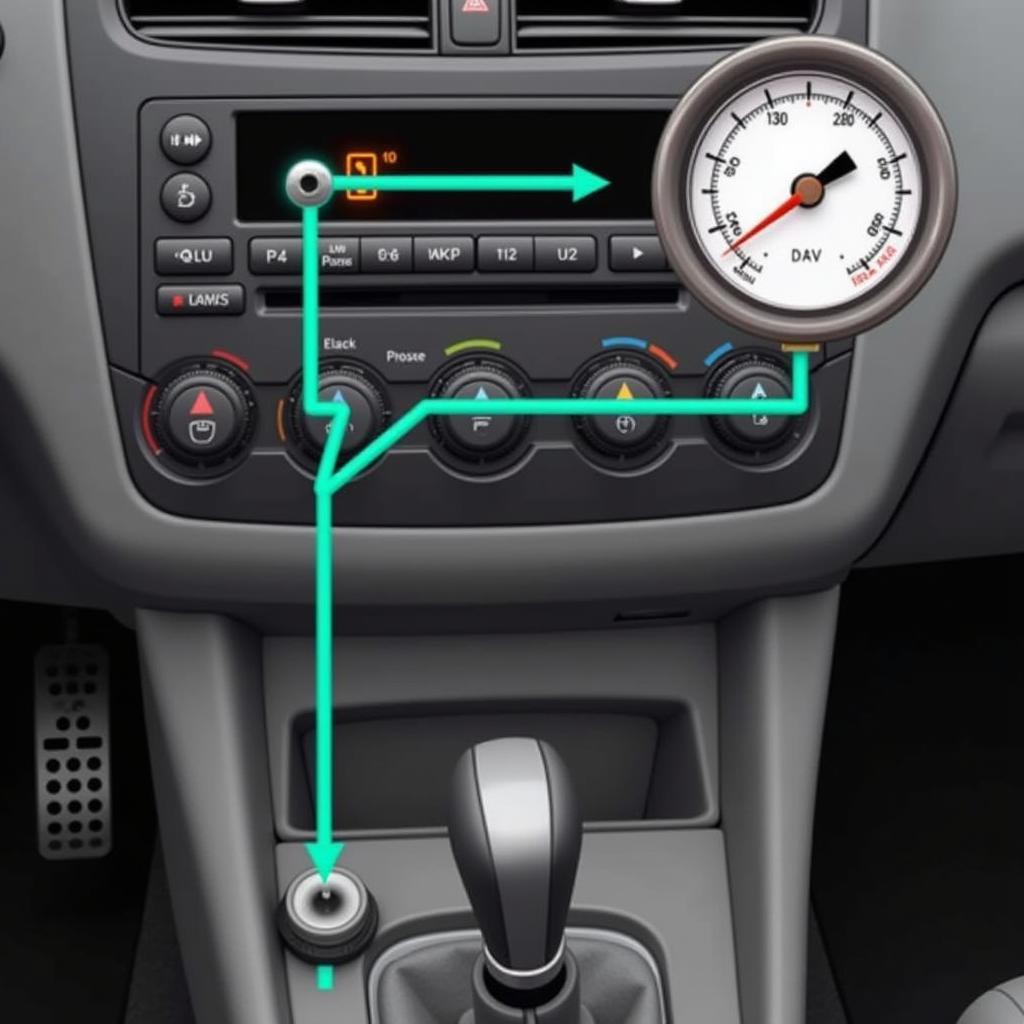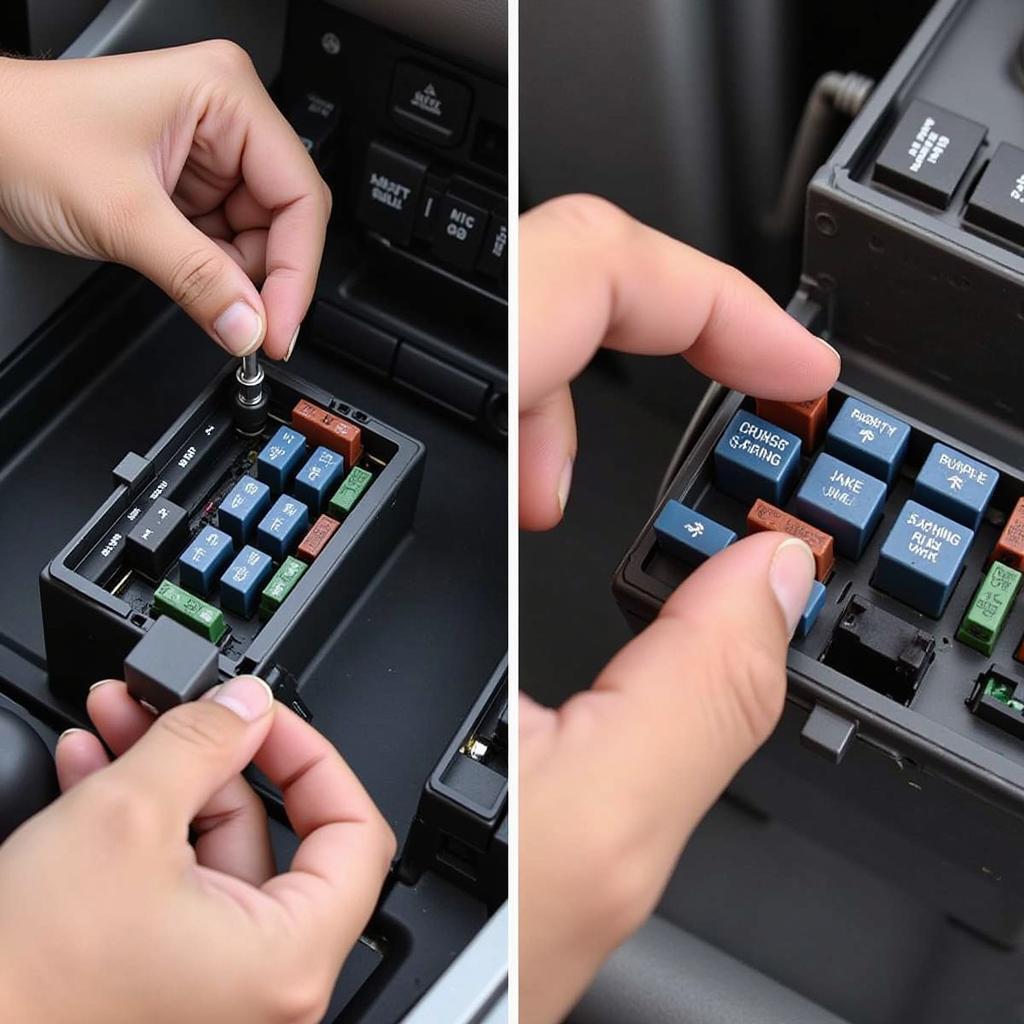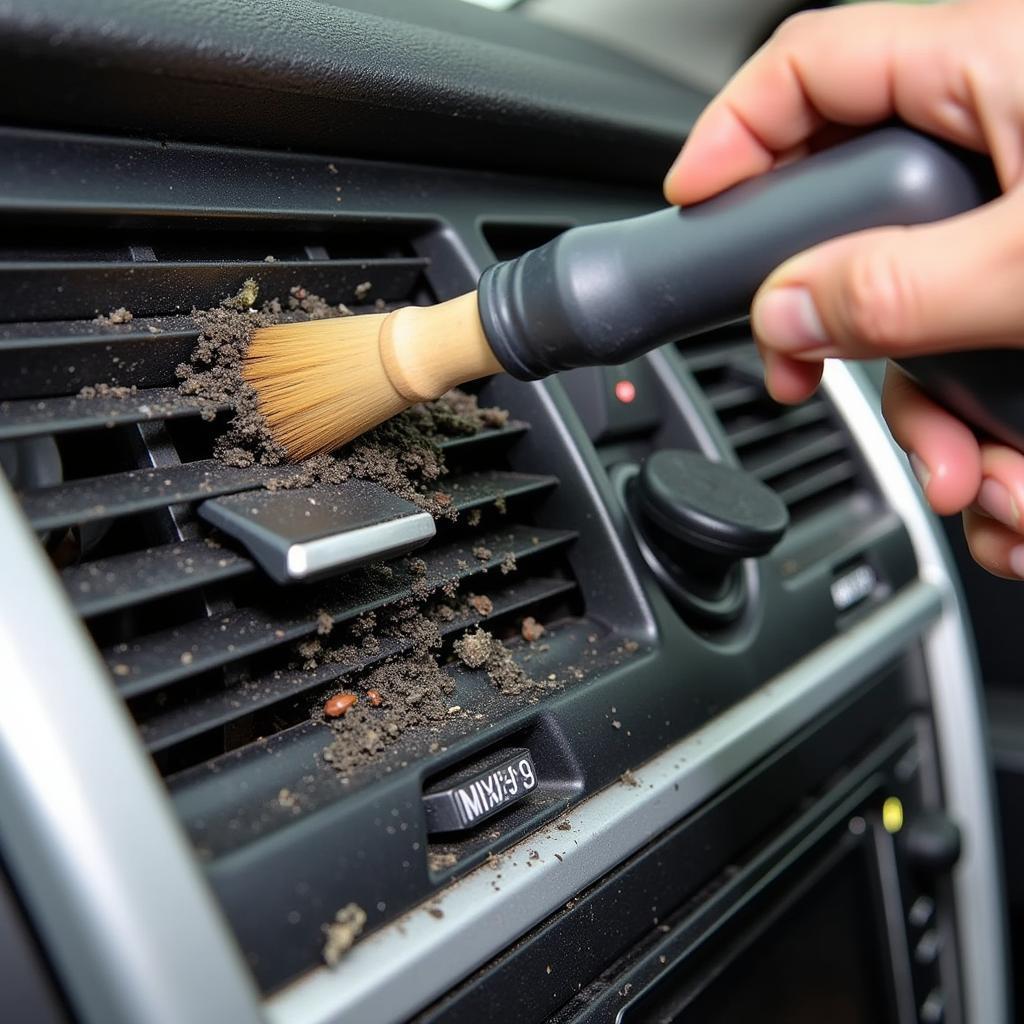Your car’s AC is supposed to provide a cool refuge, especially during scorching summers. But what happens when your car AC starts blowing hot air? It can be frustrating, to say the least. This guide will help you troubleshoot and potentially fix the problem yourself, saving you a trip to the mechanic. If your car AC is blowing hot air, understanding the potential causes and fixes can save you time and money.
After a long day, there’s nothing worse than getting into your car and finding the AC blowing hot air. Luckily, there are often simple solutions. For instance, you can find the cheapest place to get ac fixed in car.
Common Reasons Why Your Car AC Blows Hot Air
Several culprits can cause your car’s AC to malfunction. Let’s explore some of the most common ones:
-
Low Refrigerant: The most frequent reason for hot air is a low refrigerant level. Refrigerant is the lifeblood of your AC system, absorbing heat and creating cool air. Leaks can develop over time, leading to inadequate cooling.
-
Electrical Issues: Problems with the AC compressor’s clutch, fuses, relays, or wiring can disrupt the system’s electrical flow, preventing the compressor from engaging.
-
Clogged Condenser: The condenser, located at the front of your car, releases heat. Debris like leaves and dirt can obstruct airflow, hindering heat dissipation and leading to warmer air inside.
-
Faulty Blower Motor: The blower motor pushes the air through the vents. If it malfunctions, air circulation will be reduced, resulting in lukewarm air, even if the AC system itself is working fine.
-
Blend Door Problems: The blend door controls the mix of hot and cold air. A stuck or broken blend door can restrict the flow of cold air.
 Low refrigerant in a car AC system
Low refrigerant in a car AC system
Troubleshooting Your Car AC
Before rushing to a mechanic, you can perform some basic checks yourself. These steps can help you pinpoint the issue:
-
Check the Refrigerant Level: While you might need a gauge to check the exact level, you can visually inspect the AC lines under the hood for signs of leakage (oil residue).
-
Inspect the Fuses and Relays: Locate the fuse box (usually under the dashboard or in the engine compartment) and check the AC-related fuses. A blown fuse is often easily identifiable by a broken filament.
-
Examine the Condenser: Check the condenser for obstructions like leaves, bugs, or dirt. Carefully clean the condenser fins using a soft brush or compressed air.
-
Listen to the Blower Motor: Turn on the AC and listen for unusual noises from the blower motor. If you hear squealing or grinding sounds, the motor may be failing.
 Checking car AC fuses and relays
Checking car AC fuses and relays
How To Fix Common Car AC Issues
Now that you’ve identified the potential problem, here are some solutions:
Recharging the Refrigerant
If the refrigerant level is low, you’ll need to recharge it. While you can purchase DIY recharge kits, it’s recommended to have this done by a professional, as refrigerant handling requires specialized equipment and knowledge. You can sometimes find a cheap car ac fix for this problem.
Addressing Electrical Issues
Replacing blown fuses or relays is a relatively simple DIY task. However, if the problem lies with the compressor clutch or wiring, it’s best to seek professional help.
Cleaning the Condenser
Cleaning the condenser is a straightforward process. Use a garden hose or compressed air to remove debris, ensuring good airflow.
Replacing the Blower Motor
Replacing the blower motor is a more involved repair, but it’s still achievable for those with some mechanical aptitude. Refer to your car’s repair manual for specific instructions.
“Regular maintenance is key to preventing AC issues,” advises John Smith, a certified automotive technician with 20 years of experience. “Simple checks like inspecting the refrigerant lines and cleaning the condenser can save you a lot of trouble down the road.”
 Cleaning a car’s AC condenser
Cleaning a car’s AC condenser
Preventing Future Problems
Regular maintenance is the best way to keep your car AC blowing cold air. Consider these preventive measures:
-
Annual AC Service: Have your AC system inspected and serviced annually by a qualified technician. This includes checking refrigerant levels, inspecting components, and addressing any potential issues. If you’re looking for the cheapest place to fix car air conditioner, be sure to check online reviews and compare prices.
-
Regular Cleaning: Keep the condenser clean by removing debris regularly.
-
Addressing Leaks Promptly: If you suspect a refrigerant leak, get it fixed immediately to prevent further damage and ensure optimal AC performance.
“Don’t ignore warning signs like weak airflow or unusual noises,” adds Sarah Jones, an automotive engineer with over 15 years of experience. “Early detection can often prevent minor issues from becoming major repairs.”
Conclusion
Dealing with a car AC blowing hot air can be daunting. However, by understanding the common causes and following the troubleshooting steps outlined in this guide, you can often pinpoint the problem and potentially fix it yourself. For more complex issues, seeking professional help is always recommended. Remember, regular maintenance is the best way to keep your car AC in top condition and avoid those sweltering summer drives. Where can I get my car’s AC fixed? You can find resources online that list places that fix air conditioning car problems. For further assistance, feel free to contact AutoTipPro at +1 (641) 206-8880 or visit our office at 500 N St Mary’s St, San Antonio, TX 78205, United States.
FAQ
-
Why is my car AC blowing hot air on one side? This could be due to a blend door issue or a blocked vent on the affected side.
-
Can I recharge my car AC myself? While DIY recharge kits are available, it’s recommended to have a professional handle refrigerant.
-
How often should I get my car AC serviced? Ideally, once a year or as recommended by your car’s manufacturer.
-
How can I tell if my car AC compressor is bad? Signs include loud noises, no cold air, or the AC clutch not engaging. Where can you go to get your car AC fixed? Try searching online for “where can i get the ac in my car fixed”.
-
How much does it cost to fix a car AC? The cost varies depending on the issue, ranging from a simple fuse replacement to a costly compressor replacement.
-
How can I prevent my car AC from blowing hot air? Regular maintenance, including annual service and cleaning the condenser, is crucial.
-
Is it dangerous to drive with a leaking car AC? While not immediately dangerous, a leaking AC can lead to reduced cooling performance and potential environmental harm due to refrigerant leaks.




Leave a Reply